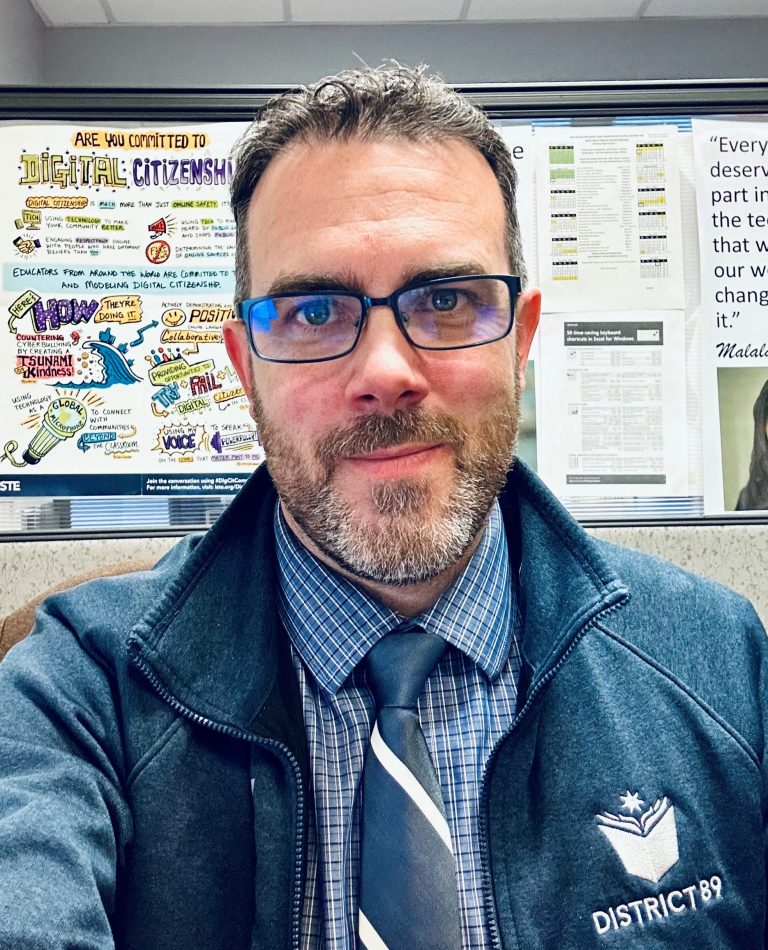We’re so happy to introduce Contributing Writer Micah Miner! Micah was chosen as a Champion of Equity in Technology Leadership in the 2022 Excellence in Equity Awards and we believe his insight and experience are extremely valuable to the equity community. Learn about him below and watch this space for more from him!
Micah Miner serves as the District Instructional Technology & Social Studies Coordinator at Maywood, Melrose Park, Broadview School District 89. He believes equity matters, not just globally, but locally. He believes all students deserve equity and access in education and life. Micah has served as a teacher in K-12 settings in both regular classrooms and alternative schools, as a social studies department chair, instructional technology coach, adjunct professor in social studies and instructional technology, and as a school and district administrator. He can be reached on social media Twitter at @minerclass on Twitter, LinkedIn profile is here, and his email is micah.miner@maywood89.org.
Thanks for inviting me to be a part of ACE-ed! I grew up in a small town and then moved to the city for school and I saw the inequities in both worlds, so I chose to pursue teaching to serve our children and help reduce barriers and improve access to a quality education to prepare them for their futures. I was blessed with experiences such as advocating for equal access for our students in Washington, D.C. during the process leading up to the passage of ESSA (Every Student Succeeds Act) and have been involved in education roles ranging from teaching incarcerated students, being an instructional technology coach, teaching in teacher preparation programs, serving as a social studies department chair, and being a school and district administrator since 2004.
I love helping build capacity in schools and districts so we can recruit, train, and retain successful teachers from diverse backgrounds so that our students can receive the education they deserve. I believe teaching civics and accurate history is essential to this goal, and work hard at making sure representation is in our social studies curriculum so students can see themselves and people that reflect their culture in their learning. I want to maximize student learning through a safe and collaborative school culture, peer and staff relationships, and family and community engagement. It is my job as an administrator to collaborate and set up systems and an environment that makes this happen.
A quote that I passionately believe in is by Nelson Mandela: “Education is the most powerful weapon you can use to change the world.” I use this as a motivator for me to work toward this broader goal.
What is your current role & what does equity look like to a district leader in both technology & social studies?
My K-8 public school district serves 4200 students in three communities near Chicago. Most students and families are Mexican American and African American students and families and many are underserved and low-income. We have nine schools, including a two-way dual language academy (K-8) to support both English and Spanish speaking families to be bilingual in speaking, reading, and writing.
Equity is a principle that requires constant attention! My district leadership supports this and matches their commitment with actions. These actions align with the equity goal that our elected Board of Education and my Superintendent already prioritize, which makes it easier to deliver on equity in technology devices and access and curriculum resources. Our students deserve the same access many of our more affluent suburbs in Chicagoland have, so we make instructional and monetary decisions guided by our commitment to equity so that our students and families are well served and given many opportunities.
My district lets me prioritize technology adoption and support technology integration with instructional technology coaches and professional development for teachers. We also invest in emerging technologies like virtual reality for our upper elementary and middle school students and are working on getting flexible seating options for all our K-5 and 6-8 classrooms over the next two years. The district also empowers us to make important instructional decisions to make sure there is diverse representation in the curriculum. This support helps me provide social studies resources that reflect our students’ cultures and backgrounds so they can see themselves in history and current events.
What is your vision of educational equity and what is its biggest challenge?
My vision of what equity looks like is access and opportunity; this is also its biggest challenge. This means access, support, and training for students, teachers, and parents in instructional technology. We must equip others to have technology access and leverage it in a way that helps students learn and grow. We are a 1 to 1 district, but it is not just about giving devices to students and teachers. Research tells us that without quality support, both students and teachers will not grow magically with just device access. To do this we were able to re-imagine how we teach and support technology.
We had technology teachers and technology classes in our buildings; but with some changes to the schedule and support from our teachers’ union, we re-imagined the position to be an Instructional Technology coach, which we call the InTech Team. They are still able to teach technology skills, but they do it by embedding it in the curriculum and pushing in to co-teach with classroom teachers. It also provides them the opportunity to teach digital citizenship in each classroom as well. InTech members meet with teachers 1 to 1 or in groups to support the technology integration, instructional planning, and teach digital citizenship in the classrooms among other supports. They also serve as the first line of support for tech issues for students and teachers before it goes to IT support team members. This proves invaluable to students, teachers, and families who are trying to learn tech. We did not create new positions, we just re-allocated current roles and provided PD (Professional Development) to shift from tech instruction to tech coaching. That is one way to make equity an action, by re-imagining what is already there and leading a change to meet the need.
My vision of social studies instruction is that representation matters, and students should be able to learn and evaluate their perspectives, culture, and backgrounds, and see how this impacts their interactions with others. We must be able to disagree without being disagreeable. It is an essential aspect to being a functional democracy. A major challenge to equity in social studies is representation of groups within the curriculum. In my view, the lack of representation, or misrepresentation, is the biggest social studies challenge in our schools.
Our curriculum team believes that instruction should provide students with windows, mirrors, and doors (Bishop, 1990). What we mean by that is that our curriculum should be a window for students to see the world from other perspectives than their own by seeing how other people live in our commonalities and differences. It should also serve as a mirror so they can see themselves, their communities, their history, and their potential futures. In addition, the students should see doors of opportunity within the curriculum as they build up the knowledge and skills. Our students need to feel like their culture and backgrounds are taught in the curriculum, but also other’s perspectives, cultures, and backgrounds. This helps build bridges to connect with others and respect everyone’s humanity even when disagreeing so students can have windows, mirrors, and doors to interact successfully with others in society.
References:
Bishop R. S. (1990). Mirrors, windows, and sliding glass doors. Perspectives, 6(3), ix–xi.
Micah Miner serves as the District Instructional Technology & Social Studies Coordinator at Maywood, Melrose Park, Broadview School District 89. He believes equity matters, not just globally, but locally and all students deserve equity and access in education and life. Micah has served as a teacher in K-12 settings in both regular classrooms and alternative schools, as a social studies department chair, instructional technology coach, adjunct professor in social studies and instructional technology, and as a school and district administrator. He can be reached on social media @minerclass on Twitter, his LinkedIn profile here, and his email micah.miner@maywood89.org.
- Micah Minerhttps://ace-ed.org/author/mminer/
- Micah Minerhttps://ace-ed.org/author/mminer/
- Micah Minerhttps://ace-ed.org/author/mminer/
- Micah Minerhttps://ace-ed.org/author/mminer/







